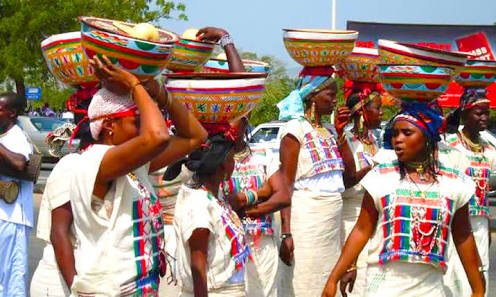
Nigeria is the centerpiece of Africa and you can find a lot of natural resources in Nigeria. Have you seen the waterfalls in Nigeria or have you tried out our agricultural products? Well I will write about that in my next post.
In Nigeria, we have about 500 different ethnic groups but the major ethnic groups are: Hausa Igbo Yoruba Fulani Bini Tiv Ijaw Nupe.
In this post, you will learn about Hausa's culture and their hero (Bayajidda).
Hausa is predominantly found in the north-western part of Nigeria, they were Islamized even before the Sokoto Jihad of 1804. By the time of Jihad a distinction could be made between the pagan Hausa and the muslim Hausa.
THE LEGEND BAYAJIDDA
A certain hero, Bayajidda was a refugee prince from Baghdad, he left the Middle east and stayed in Kanem for a while where he married a princess called Magira (daughter of Mai, Mai means King).
He fled westward in order to escape his father-in-law (Mai) wrath so he abandoned his wife and his male child.

Photo source
Before reaching Daura, he killed an evil snake that prevented the people of Daura from fetching water from a well. In Daura, the queens are not allowed to marry, they were the only rulers but Because of Bayajidda's bravery, he was allowed to marry the then Queen of Daura whose name was Magajiva, he became the ruler of the state.
His descendants are claimed to have founded what was known as the seven Hausa state of
Biram, Bagauda (Kano), Gunguma (Zazzau), Duma (Gobir), Kumayo (Katsina), Zamma (Rano) and Gazora (Daura)
The differences between pagan Hausa and Muslim Hausa
Pagan Hausa lived in small villages of exogamous patrilineal kin and they worshipped natural spirits which were referred to the Iskoki gatherers
Muslim Hausa had a large centralized system, they had highly developed technologies and economy.
Reference from a textbook
X-Ray of Nigeria by John Lekan
Proudly Nigerian
Thanks for reading.
Upvote
Comment
Follow to read more interesting articles and stories


Hi! I am a robot. I just upvoted you! I found similar content that readers might be interested in:
https://smsstudycentre.wordpress.com/2015/08/09/gst201-nigerian-peoples-and-culture/
Thanks for pointing out the quoted source
@plojslydia, You have been scarce